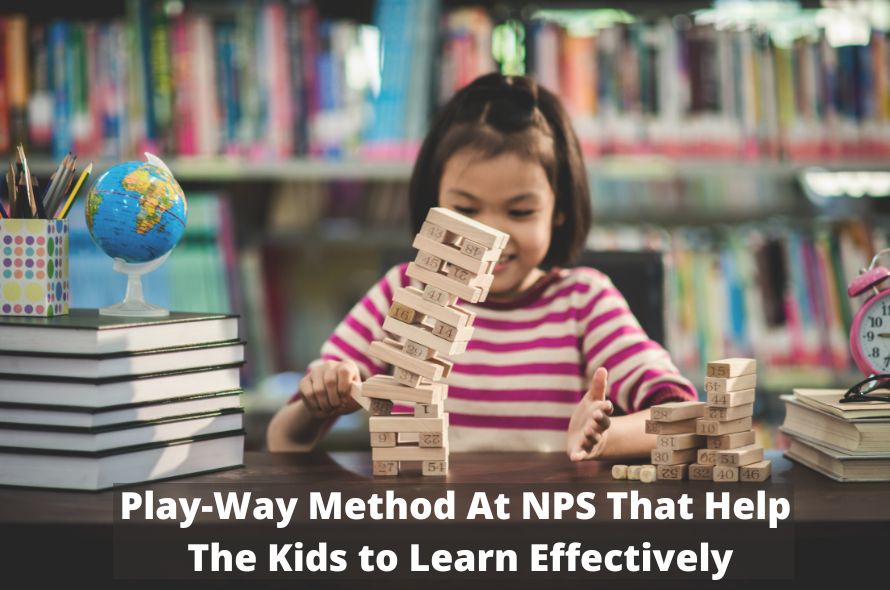Play-Way Method At NPS That Help The Kids To Learn Effectively


Playing is essential for children’s development since it promotes their general well-being. Play is good for fostering creativity and enjoyment, yet many people still view it as a barrier to a strong academic program. At NPS Vidhyaranyapura, we think that having fun is just as important for children as giving them a balanced diet. In reality, playing and having a good time with friends embodies childhood, and if done right, playing can be a great educational tool as well. We have a play-way notion of learning in our curriculum for this very reason. The play-way or play-based approach to education is followed by the idea that kids can learn things on their own. Although there is no direct instruction, teachers deliberately prepare the setting to encourage the child to explore, inquire about, and comprehend his/her surroundings. This approach primarily applies to kindergarteners (ages up to 5 years), whose growth demands lots of unstructured play, movement, and exploration.
At NPS, the top schools in north Bangalore play serves as a driving force that encourages each child’s intrinsic strengths and potential as education centred on activity-based learning. In general, the play-based learning approach aims to teach children via mental and physical exercises that foster self-expression and skill growth. Children can participate and engage in learning without the pressure of performance and evaluation when enjoyable classroom activities are designed, allowing them to express themselves freely and enhancing their self-esteem.
A couple of activity-based learning that is proven to be effective is detailed here.
1. Using play-activity boxes to teach
Children receive instructional activity boxes instead of toys to play with. Children can create new objects, discover new ways to overcome obstacles and learn lessons by carrying out specific tasks through the use of these play-based educational activities.
Early child development is supported in a fun and interesting way by this type of unstructured play and experiential learning, which is specifically created to enhance and engage young minds.
2. Instruction using a real-world setting
Here at NPS Vidhyaranyapura, we think that education shouldn’t be limited to a classroom setting. In order for students to better understand the teachings being taught, they should be connected to the actual world. Students’ attention can be kindled and their involvement in their academic pursuits increased by incorporating real-world learning or planning field trips for topics related to nature. Some teachings, such as those regarding animals, birds, vegetables, and colours, are better taught outside of the classroom to excite pupils’ attention.
3. Developing EQ is just as crucial as IQ
Being able to identify, comprehend, and manage emotions is known as having an emotional quotient (EQ). Low EQ can lead to aggressive behaviour, anxiety, despair, poor academic achievement, etc. As a result, teachers place equal emphasis on EQ development in addition to IQ development because it helps students control their emotions, enhances academic performance, and lowers anxiety and behavioural issues.
4. Kids’ do-it-yourself (DIY) projects
Kids are given the chance to let their creative impulses run wild by crafting paper dolls, kaleidoscopes, toy vehicles out of recycled bottles, and other crafts. Simple items are provided, and they are instructed to make something with them.
Kids can be inspired and engaged by DIY projects, which contribute to their overall development as learners.
5. Role-playing
One of the most beneficial and enjoyable leisure for youngsters can be role-playing. Children’s role plays help them learn, focus, and use their imagination.
During role plays, kids can pick up a lot of new abilities and improve their emotional expression. It helps kids to put themselves in the shoes of fictitious characters and conduct themselves as they would in real life. Thus, role play is a pleasant approach to teaching kids about everyday events, holidays, and jobs.
Conclusion
Holistic development of the child is possible with activity-based learning. The brain develops to its maximum size during the first six years and lots of unstructured play, movement, and exploration helps in its development. NPS Bangalore, provides adequate activity-based learning so as to ensure your child develops in all the facets of life.





